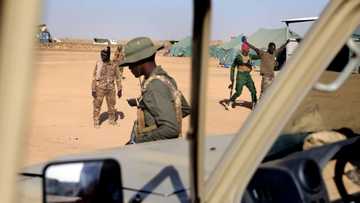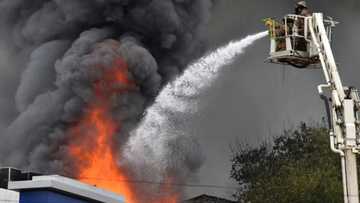21 native Hausa words and phrases and their meaning in English
Hausa people predominantly occupy the northern half of Nigeria. They speak the Hausa language. This Afroasiatic language is influenced by Arabic because a significant population of people from this ethnic group are Muslims. If you interact with people from this community, you should know some Hausa words to facilitate communication with them.
PAY ATTENTION: Click “See First” under the “Following” tab to see Legit.ng News on your Facebook News Feed!

Source: UGC
Did you know that, unlike other languages, Hausa presents a wide uniformity wherever it is spoken? It does not have many dialects. Knowing key Hausa words will enable communication with people from this community regardless of location.
Native Hausa words and phrases you should know
Many adults find it challenging to learn new languages. However, they can learn the basic words and phrases to facilitate communication. Below, we explore various Hausa words and their meanings to make your interaction with people from this community better.
Basic native Hausa words
Check out these basic Hausa words and their meaning in English.
PAY ATTENTION: Join Legit.ng Telegram channel! Never miss important updates!
- Sannu: Hello
- Na gode: Thank you
- Daina: Stop
- Dadi: Delicious
- Ruwa: Water
- Sunana: My name is
- Sai sannu: Goodbye
- Taimako!: Help!
- Nawa?: How much?
- Asusun banki: Bank account
- Kuɗi: Money
- Shiru: Quiet
- Babba: Big
- Karami: Small
- Mai kyau: Good
- Kai: Head
- Idanu: Eyes
- Yau: Today
- Gobe: Tomorrow
- Yanzu: Now
- Dare: Night

Source: UGC
Hausa phrases you should know
Below is a collection of basic phrases in this language and their meaning.
- Ina buƙatar taimakonka: I need your help
- Ka kula!: Watch out!
- Bari in tafi: Let me go
- Ina za mu tafi?: Where are we going?
- Ina buƙatar lauya: I need a lawyer
- Zan iya amfani da waya/ kwamfutarka?: Can I use your phone/ computer?
- Kyale ni: Leave me alone
- An ɓata mini rai: I am hurt
- Ina buƙatar likita: I need a doctor
- Na ɓace: I am lost
- Barka da rana: Good afternoon
- Kana lafiya?: How are you?
- Mene ne sana’arka?: What do you do for a living?
- Ina lafiya: I am fine in Hausa
- Na yi farin cikin haɗuwa da kai: I am pleased to meet you
- Sai anjima: See you later
- Na fahimta: I understand
- Ban fahimta ba: I do not understand
- Maraba: You are welcome
- Yi haƙuri: I am sorry
- Ina murna: I am happy
- Nawa ne wanna?: How much is this?
- A in azan samu canji?: Where can I get my money changed?
- Dan Allah kai ni zuwa ga _: Please take me to_

Source: UGC
What are some Hausa romantic words?
Some romantic words you can use in this language are masoyina for my love, gimbiya for princess, zuciyata for my heart, mai raina for the owner of my life, or kyau daya for the beautiful one.
What is a baby called in Hausa?
In this language, a baby is called jariri, and the plural is jarirai. Other words are yaro for a male child, or yarinya for a female child.
How do you say "where are you going" in Hausa?
To ask where someone is going, ask the ina za ka? If you are stranded, you can use Hausa to English Google translate services.
How do you say nice in Hausa?
You say mai kyau to mean nice.
How do they greet in Hausa?
Common greetings in the Hausa language are sannu for hello, kana lahiya? for how are you?, ina kwana or barka da asuba for good morning, and ina wuni for good afternoon.
How do you say "what is your name" in Hausa?
You say menene sunan ka? if asking for a man's name or menene sunan ki? when asking for a female's name.
Without communication, life would be extremely difficult. We hope the Hausa words and phrases above will help you communicate better with people from this community.
READ ALSO: Origin of Igbo tribe in Nigeria: Interesting theories to know
Legit.ng recently published details abut the origin of the Igbo tribe in Nigeria. Igbo is one of the largest ethnic communities in the country. The community has rich traditions, values, and norms.
You can find Igbo people in Owerri, Onitsha, Nnewi, Aba, Okigwe, and Orlu. The Igbo tribe occupies the eastern, south-eastern, north-eastern, western, and northern parts of Nigeria. The community has about 30 dialects.
Source: Legit.ng

Khadijah Thabit (Copyeditor) Khadijah Thabit is an editor with over 3 years of experience editing and managing contents such as articles, blogs, newsletters and social leads. She has a BA in English and Literary Studies from the University of Ibadan, Nigeria. Khadijah joined Legit.ng in September 2020 as a copyeditor and proofreader for the Human Interest, Current Affairs, Business, Sports and PR desks. As a grammar police, she develops her skills by reading novels and dictionaries. Email: khadeeejathabit@gmail.com

Cyprine Apindi (Lifestyle writer) Cyprine Apindi is a content creator and educator with over six years of experience. She holds a Diploma in Mass Communication and a Bachelor’s degree in Nutrition and Dietetics from Kenyatta University. Cyprine joined Briefly.co.za in mid-2021, covering multiple topics, including finance, entertainment, sports, and lifestyle. In 2023, she finished the AFP course on Digital Investigation Techniques. She received the 2023 Writer of the Year Award. In 2024, she completed the Google News Initiative course. Email: cyprineapindi@gmail.com





